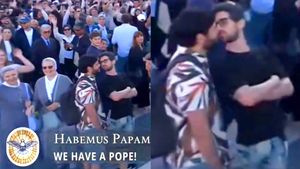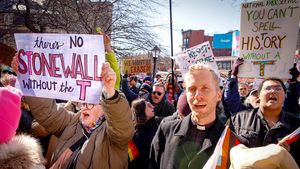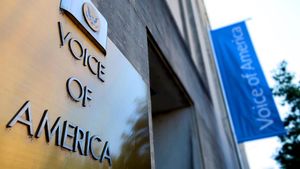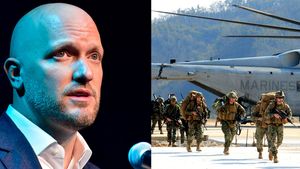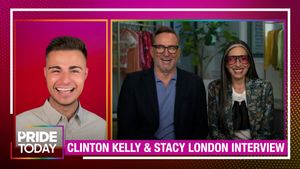Produced by Chronicle Cinema, Conversion is a new documentary film that follows the story of five survivors of conversion therapy, the disproven, dangerous, and discriminatory practice of trying to "cure" or "fix" someone's queerness or gender identity.
These five survivors are Elena Joy, Matt Ashcroft, Sam Brinton, Zach Meiners, and Dustin Rayburn, who most of us know better as Dusty Ray Bottoms from season 10 of RuPaul's Drag Race. The documentary was also directed by one of the featured survivors himself, Meiners.
In the film, Rayburn and the other survivors go into detail about their horrifying experiences with faith, family, and conversion therapy. Rayburn even recalls a time when they went through an "exorcism" that was supposed to turn them straight. With so many diverse stories being told as they relate to denying one's queerness, Conversion shows how these methods have evolved over the years and the extreme dangers that they pose to young LGBTQ+ individuals.
During an interview with Out, Rayburn talked about their appearance in Conversion, their time on and post-RuPaul's Drag Race, and where they currently stand when it comes to faith and family.
Scroll through to read our interview with Dustin Rayburn - and learn more about the Conversion documentary film on its official website.
Out: You explained in Conversion that you come from a very religious family and that you yourself, at a young age, just couldn't fathom the possibility of accepting your sexuality. Why do you think that so many young people get stuck in that mentality for such a long time?
Dustin Rayburn: I think religion is really a big part of that. As a kid, you look up to your adult figures and they're really the ones that are setting the tone for how your day-to-day life is going to be. If they are religious, they'll take you to church and you will learn all of those rules and regulations that God has set up for us. And it comes down to... I feel like your family is misled, and they believe a certain way, and so they are going to teach you their beliefs. When you're young, you think that is the only way. It is this or nothing.
You went through this kind of exorcism that was meant to convert you into a straight person. It was interesting to me that you started to question that method when you realized that they were asking you to do things that went completely against their own set of beliefs. Like, you mentioned 'speaking in tongues' being something you weren't supposed to do.
My grandfather was a minister who traveled the world opening churches, so every conversation that I had with my family, it was always a Christian-led conversation. It was about God, it was about how to live, and tongues were talked about. And I knew that speaking in tongues was supposed to be the Holy Spirit filling you, and you're just overtaken with God, so you just start speaking this thing. And in all the years that I've been in church, I've seen this happening all the time... but I've never had that Holy Spirit, that magical thing, come over to me to start doing that. So knowing what the rules are, and then seeing something is happening that goes against the rules, just made me be like, 'Oh, wait a minute, this is crazy.'
My father is standing in front of me and these people are asking me to do this, but this guy in front of me told me not to do that. I'm like, 'What is going on? This can't be right.' And the exorcism was so awkward and so long. It felt like it took two days to get through, but it was probably just two or three hours. And by the time I had that click in my head, I just knew that I had to keep agreeing and doing what was asked of me because if I didn't, it would've taken even longer, the whole process. So I was going along. I said everything they asked me to say and I did what they told me to do, other than trying to speak tongues, because that was just out of the question for me.
And yet, you still walked away from that situation thinking that this spiritual procedure worked. Can you walk me through that confusing back-and-forth that was going on in your head?
I did everything that was asked of me, so when I left that situation, I felt different. I felt like a changed man altogether. I felt like a gorilla had been lifted. All the weight of the world was gone. And the thing that was so confusing about that is because, you're right, I thought that that made me straight and I thought that I was changed and fixed. But the thing is... I had no secrets anymore. Every sexual experience, every shadow of my life, they put light on everything, and I had to talk about it. So I left that room with a reset slate, I had a clean slate to go do anything, live anything I want, and make the mistakes I want, because every mistake or anything that I had done was already out in the open. I had no more secrets, and that was the biggest change. I didn't realize that having that taken away from me is a new space of feeling. And that was very confusing. That made me think that I was straight.
So I was meeting with these pastors, and that's when they were feeding me all the stuff about if I continued on a homosexual lifestyle, I'd be miserable, all this stuff. Just really beating me down every time I talked to them. And it was in that instance, talking to a pastor, that everything just came full circle and was like 'Whoosh, you're not straight. You're having these meetings with these people and they keep beating you down over this. You're still gay. They know it and that's why they're being so harsh in beating you. To make you know that you can't continue on doing this, because they know you are gay.'"
Do you still consider yourself religious, or do you have some spiritual practice of any kind?
I do not. The day that my mom knocked on my door and we had our coming out talk, the night before I cried out to the universe. I said, 'I can't do this anymore. I need a change in my life. I need to live my true authentic self, whatever that is. If it's being straight with my Christian family or being homo, I need this to happen.' The next morning, my mom knocked on the door and we had that hard conversation. So I know that the universe is listening. I know that there is some greater power that what you put out there, it is heard and comes back to you. But I do not believe in American Jesus. I do not believe in American Christianity. So that's where I stand.
The first time the public heard about your experiences with conversion therapy were during season 10 of RuPaul's Drag Race. How did it feel to share that story on TV for the first time?
I didn't even know that [what I went through] was called conversion therapy to begin with. People would be like, 'So what happened when you came out? What's your coming out story?' And I was like, 'Well, I got exorcised.' And then people would just look at me with a smile and shake their head because they couldn't sympathize with me... they didn't see it, they didn't go through it, so they don't know what it was like. It wasn't until I shared my story on RuPaul's Drag Race that I started getting 'me too' messages. Like, 'My brother went through this, my uncle, I know someone going through it now.' That was literally the first time that I had another person saying, 'I did that. I see you. I understand what you've gone through.' And it was such a huge full-circle moment for me.
From my perspective, it felt like you walked away from Drag Race feeling a little disappointed by everything that went down. Was that in any way related to sharing your personal story on the show?
Going into Drag Race, I was nervous to tell my story because a.) I'd never heard it before and b.) growing up in the church, I was scared to talk against the church. But there was just this little thing inside me that was like, 'You have to share your story.'
Leaving Drag Race after sharing my experiences opened up the world of love to me. The world showed me so much love and respect for my story, and that means a lot. I'm so lucky that I've been able to travel the world to share that story and to help others. But no, my disappointment with Drag Race, I don't think has anything to do with my story. I think it just has to do with the disappointment of... I was shook when I was there and I wasn't one hundred percent in my head, and I didn't meet my goals in that situation. So I was upset about that.
Your season of Drag Race aired in 2018 and the Conversion documentary is coming out in 2022. It's been four years between those projects, so it was really disheartening for me to hear you say in this documentary that your parents still think that being gay is a choice and that your relationship with them is still not ideal. Have they been able to watch you on TV or in this movie? What's that relationship like right now?
The relationship is hard, but I think you have to work at any relationship. And this relationship, specifically, takes a lot of work. I love my family very, very much. However, no, my family has not seen the documentary, they have not watched Drag Race. It's unfortunate, but we keep Dusty Ray Bottoms very separate, and the work that I do [in drag is] very separate from our conversations. They can't handle it and it is what it is. But we're working on it and I love that there's hope there.
Your part in the Conversion documentary ends with footage of you getting married to your partner, and it feels like a real full-circle moment for the film. I think it's very important for anyone watching this documentary who might be considering conversion therapy to see you so happy in that moment, and to realize that things like marriage and family are not exclusive to straight individuals.
The thing that I think is so special about our documentary is that it is so well-researched. We have real licensed therapists, doctors, and activists talking and sharing their stories. We have facts, we have... It is just so well-done that I feel like if anyone, a parent, a conservative, a Christian, a liberal, someone just picked out of an island that's never heard of it before... I feel like if you watch this movie, you will be educated from start to finish on what conversion therapy is. You will get to see the beautiful lives of these five survivors from all over the US and Canada, from all different walks of life.
You'll get to see how our stories are similar but vastly different, which makes it very scary, because conversion therapy is always changing and morphing. But there's still the same throughline of ripping you down and tearing you apart. And that's what I think makes our film so special is you really get to see the facts and you get to see the hope and the love that's there.
That's all beautifully said, but I still want to talk about your gorgeous wedding, Dustin! Can you tell me more about that experience? How did you feel on that day? Watching you speak during the wedding, it made me really emotional.
It was absolutely amazing. It was really a dream come true. Growing up as a little queer person and being religious and being very young, you go to these weddings and you just hope that, one day, you can find the person that is right for you. But it felt so hopeless. I never thought I would have a husband, I never thought I could start a family or even think about it. There was always dating, but every time I would date a guy, the pastor would be in the back of my mind saying, 'This is wrong. You can't have this. This is not for you.'
And just to be at my wedding day looking at my beautiful husband and to look over my shoulder and see that my mom and dad showed up, it was really just incredible. So even that goes to show you, even if my family doesn't believe in homosexuality, they still came through for me and showed up for my wedding day to be there for me and my husband. And that's something that I will forever be grateful for, no matter where we stand in our relationship. Even thinking about that, I never thought in a million years my dad would be at my gay wedding. But he was there.
RELATED | 10 Celebrity LGBTQ+ Couples Who Got Engaged in 2022









































